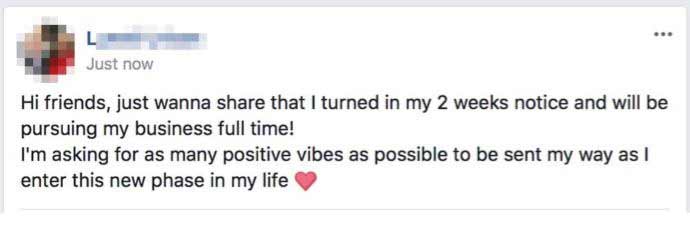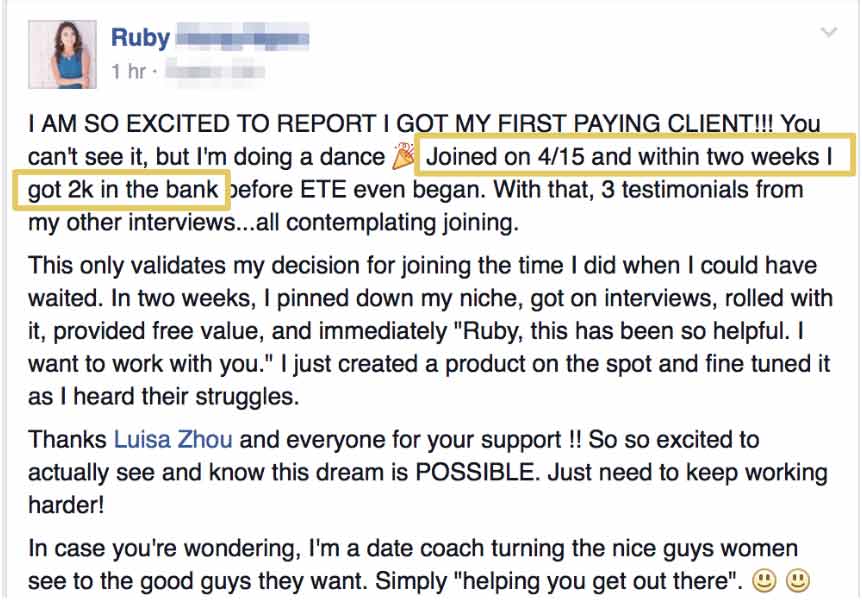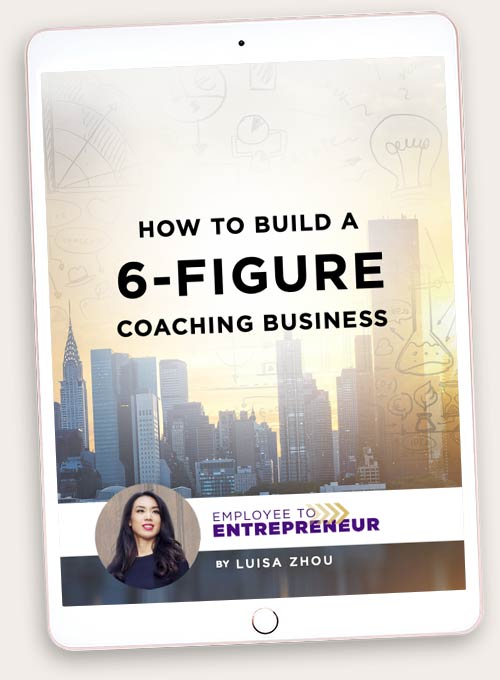How do you get testimonials from clients?
If you’re struggling with asking for testimonials, you’re in the right place. Today, you’ll learn how to ask for testimonials from clients without feeling pushy… And getting raving reviews.
Want to learn more? Read on!
Why do you need testimonials?
You know how it is:
Potential clients are ready to pay your high-end prices if you can show them amazing testimonials.
After all, people buy from businesses they trust. To build that trust, you need testimonials.
Testimonials like these:


How do you get them?
Here’s what you need to know.
What is a testimonial?
A testimonial is a review by a client or someone who has used your product/service that they give, in full integrity, about your business. The difference between an average and a great testimonial is this:
A so-so testimonial says, “I liked working with ___.”
A great testimonial says, “This person helped me do ___, so that I got the result ___.” It explains why someone liked a product or service and why.
Why do testimonials work?
Testimonials are social proof. Someone else has tried your services and is now vouching for them, so they help you differentiate yourself from your competition.
And according to a lot of experiments, studies, and research, social proof impacts people’s decision-making.
For example, experiments by social psychologist Robert Cialdini show just how big this impact can be. (You can read more in his book “Influence,” which I highly recommend).
In one experiment, a hotel added signs to its bathroom with the message, “The majority of the guests who have stayed in this room recycled their linens.”
The result? Those signs outperformed signs that asked guests to reuse towels to protect the environment by 10-12%.
Also other experiments, including one where people were asked to protect nature because other people did it, had a positive impact.
Other research backs this up. A study from 1982 followed researchers who requested donations door-to-door. The researchers showed a list of other residents from the neighborhood who had already donated.
People were more likely to give money if the donor list was longer. Again, this goes to show that people take cues from other people’s behavior to make decisions.
In other words:
If your testimonial shows that other people have used your services, people are more likely to buy.
And according to the Edelman Trust Barometer, 67% of respondents say that they will buy a product based on a good reputation, but if they don’t trust the company, they will stop buying it. 77% say online reviews and 73% say reputation are deciding factors in their brand buying decision.
According to Statista, 19% say that they feel it’s extremely important to read online reviews before buying a new product. 38% say that it’s really important.
And an experiment by WikiJobs shows that when testimonials were added to a page, conversions increased by 34%. According to Econsultancy, 63% of site visitors are more likely to make a purchase if the site has reviews.
Now you know why testimonials are so important. But how do you get them?
That’s what we’ll look at next.
How do you collect testimonials from clients?
Now you know WHY you should get testimonials. But how do you ask for them?
Here’s how to get testimonials if you either don’t have any clients yet, or if you already have existing clients. You’ll also learn how to ask for video testimonials too.
How do you get testimonials if you haven’t worked with any clients?
What do you do if you’re new to business and need testimonials to get new clients… but haven’t worked with any clients just yet?
There’s this common misconception about testimonials:
That you have to get them from paying clients.
But that’s not true. If you’ve helped someone achieve a result, you can absolutely get a testimonial from them. What they verify is that you helped them get that result (which isn’t dependent on if they paid you money or not).
Get testimonials from your network
You likely have helped people in some way already by now.
For example, when I started my career coaching business, I had helped friends and co-workers with their careers.
As a result, those people had gotten raises, they’d moved to different industries, and been promoted.
So I reached out to them and asked, “Would you be willing to share a blurb about how my advice directly and specifically helped you get this result?”
They didn’t pay me. I was mentoring them as a friend or manager. But the important thing was that my advice was able to help them.
They were happy to give me testimonials and that’s how I started getting social proof.
If you’ve already helped some people in your network, you can reach out to them with this email script:
“Hey (name),
I loved what you shared about (the result you helped them get)!
Would you be open to giving me a quick testimonial about your results that I can use in my new business? Let me know and I’ll send over a list of questions. I’d be happy to put them together into a short blurb that I send to you.
Let me know!
Thanks,
(Your name)”
Get testimonials from free services
But when I started my next business, an advertising consulting business, I hadn’t worked with people in my network before. I worked in digital advertising at my 9-5, but I knew I needed testimonials from other people.
That’s why I had to start from scratch with social proof.
I figured that the best way was to reach out to people and do a small project for free.
So, I asked myself, “What’s the smallest project I can do for free and help people get results, without having to do a lot of free coaching for months and months on end?”
I came up with an ad audit that took about 30 minutes of my time. I would look over someone’s ads and after the people I coached had used my improvements, they’d share a testimonial with me.
Think through:
What can you do? Can you offer some sort of audit? Give them one tangible tip that they can use to see improvements?
If you need to work with someone over a longer period of time to get results, keep it specific and make sure you both understand what the outcome will be.
For example:
“We will work together for two months and the goal is to get you to point X and that in return, I’m not going to charge you anything. All I ask for is a testimonial at the end.”
That said, having helped over 1,000 people start their coaching and consulting businesses, I haven’t yet seen a case where there isn’t some shorter, upfront, free audit or coaching session you can use to start getting those first few testimonials.
How do you ask for testimonials from your existing clients?
Now you know how to ask for testimonials if you don’t have clients just yet. But what if you’ve already worked with some?
Choose the right time
First, you need to time your ask right. Ask for the testimonial at the end of your work together or right after you’ve helped your clients get a win (such as: your client has lost weight, saved money, earned more money, found a new job, started a relationship, or gotten more confident).
Ask for your testimonial
Second (this might seem obvious), ask! If you don’t ask, no one’s going to know that you’d appreciate a testimonial from them.
Make it easy to say yes
You should also make it easy for people to give you a testimonial. Otherwise, it might become this huge deal for them and they end up never sending it to you.
The way I ask for testimonials is to send people a list of questions and say, “I’ll put it all together into a paragraph or case study and you can approve the final testimonial.”
Questions to ask
The questions to ask can be similar to these:
“What was it like before we started working together and afterward?”
“What was it like working with me? Were you happy with the experience?”
“What were your results? Can you be as specific as possible?”
“If someone was thinking of hiring me, would you recommend that they do so or not?”
You can use this script to send as an email (or ask on a call with your client):
“Hey (name),
I’ve loved seeing your progress over the past few months. Not only did you (result), but you also crushed your goal to (result).
Now that you’ve hit your goal, would you be open to give a testimonial about your experience working with me? Let me know and I’ll send a list of questions. I’d be happy to put them together into a testimonial and send it to you for final approval.
Let me know!
Thanks,
(Your name)”
How do you get video testimonials from clients?
You can share your testimonial as a short blurb…

But even more powerful is to get a video testimonial.
You see, video converts really well, better than text. People are 4x as likely to watch a video about a product than read about it.
Ask your clients to hop on a quick, 5-10-minute video conversation that you record (note: for a conversation, not an interview).
During your conversation, you can use the same questions that I shared above.
And this email:
“Hey (name),
I’ve loved seeing your progress over the past few months. Not only did you (result), but you also crushed your goal to (result).
Now that you’ve hit your goal, would you be up for a 5-10-minute recorded video call where we’d discuss your awesome results? I’d really appreciate it!
Let me know!
Thanks,
(Your name)”
Here are some of my own video testimonials:
What does a powerful testimonial look like?
You want your testimonials to do as much heavy lifting as possible for you. But what should you include in them?
Show the transition
The biggest mistake people make is to use testimonials that focus on them and not the results they help their clients get.
“She’s so nice to work with” is not at all as intriguing as someone saying, “she helped me achieve my goals X, Y, and Z.”
The thing is:
You help your clients get results, no matter what your product or service is. (Even if it feels like an “intangible” result.)
Let’s take confidence coaching, for example, which is often considered intangible.
As a confidence coach, you might do a 30-minute free confidence coaching session where you help someone improve their confidence at meetings.
You could ask:
“What was your confidence like before we started working together? Could you give me an example?”
And ask for the results:
“What was it like speaking at meetings before our session? What was it like after?”
While you can’t measure confidence, you can show the difference in specific situations before versus after working together. That is completely tangible. That’s how you get testimonials that show your clients how you can help them get the results they want.
Include photos (and video)
As research shows, photos add credibility. Ask if you can use your client’s headshot to go along with the testimonial.
And as we’ve established, video is persuasive. Use video together with a written testimonial for the best results.
Make your testimonials visible
Don’t hide your testimonials at the bottom of the page. If you do, people might not notice them at all. Instead, place them visibly above the fold.
You see, in one conversion experiment, a landing page got 64.53% more signups after testimonials were moved above the fold.

Want to Build a 6-Figure Coaching Business So You Can Achieve More Freedom?
When you sign up, you’ll also receive regular updates on building a successful online business.
How do you use your testimonials?
You might be thinking:
“But what do I do with all the testimonials I collect?”
Great question. Use them on your website (your homepage, Work with me page, or About page).
In your emails…
And use them in webinars, ads, and your other marketing material.
As well as your sales pages.
Now, what are some other ways to collect as many testimonials as possible? That’s what we’ll look at next.
16 other ways to collect testimonials
Directly asking your clients for testimonials and getting on video calls are just two ways to collect testimonials.
Other ways include…
1. Emails/direct messages
Have you ever received positive client feedback over email or direct messages? Email them back and ask (a) if you can use that email as a testimonial or (b) that they give you a testimonial based on their feedback.
They’re likely to say yes because they’ve already shared how happy they are with your services.
2. Online groups/forums
Research online groups and forums, such as Reddit or Facebook groups, to see if people are posting about your business. If they are, message them and ask them if you can use their post or if they’d be willing to give a new testimonial.
The easiest way to find testimonials about your business on sites like Reddit is to google:
Site:reddit.com “your business name”
3. Your own online groups
If you have your own Facebook group, Slack channel, or another online group, you likely get testimonials in those groups. If you see someone posting about your business, message them and ask them to hop on a video call or give a written testimonial or case study.
In my own groups, I get a ton of testimonials. Because I’ve been in business for so long, I pretty much get some form of testimonial every week, like this one:

4. Twitter
Another place where people might be posting about you and your business is Twitter. Use the search bar to see what people are saying about you.
Alternatively, if your audience is hanging out on Twitter, ask them to share their experience there. You can create a hashtag and encourage them to use it so that you easily find their testimonials on the platform.
5. LinkedIn
LinkedIn is great for testimonials.
Maybe you’ve already gotten recommendations for the products or services you sell in your business. If yes, awesome! You have your first testimonials.
But you can also ask people in your network or clients to add their recommendations to LinkedIn. It’s a really easy step for them to take and now you have testimonials that you can use.
And why not share your testimonials as LinkedIn posts to give them a broader reach?
6. Instagram
Instagram is another social media platform that’s a gold mine for testimonials.
There are plenty of ways to use testimonials here. Use them in your stories, posts, and ask clients to tag you and share their results in their stories and posts.
If you benefit from more visual content (for example, as a health coach), you can ask clients to share before-and-after pictures. If they lost weight, then they can show what they looked like before and after working with you. Or if you’re a stylist, they can share their style transformation. You get the gist.
The same goes for a lot of niches. For example, someone who has become more confident can share a picture of them giving a speech. Or someone who learned how to manage their finances can show a picture of their new lifestyle.
7. Facebook pages
If you have a Facebook business page, people might already have left reviews of your business. Use those as testimonials or ask people to share more in-depth testimonials directly with you.
And ask followers to share a comment on the page with a testimonial.
8. Google and Yelp reviews
Another great place to get testimonials is to look at your Google and Yelp reviews (this works best if you have a physical office or store). Use the reviews as they are or ask people to give longer testimonials.
And if you don’t have any reviews yet, encourage happy clients to leave you Google reviews.
9. Niche review sites
Other niche review sites can include reviews of your business. Trustpilot, Amazon, Upwork, and Thumbtack are just a few examples. Niche sites where your audience hangs out can be great for testimonials.
Here’s what I mean: If you’ve self-published a book, you can use your Amazon reviews as testimonials. Or if you’re a graphic designer, using reviews you get on a site like Upwork can work well.
10. Send out a survey
Send out surveys to collect testimonials. This works best if you have clients you don’t talk to personally, such as when you’re selling a digitalcourse or similar.
You can ask the same questions as you would in an interview.
The answers you get can work great as longer testimonials. Or ask them to hop on a video call.
11. Blog comments
If you have a blog, your readers might be posting comments where they tell you how much your content or services have helped them. Those are testimonials you can use, especially if you ask them for more details.
(Remember: If people get results from your services or content, even if they’re free, those results are completely valid as testimonials.)
12. Testimonial page
A page where you gather all your testimonials is an effective way to share them. Whenever someone wants to learn about your results, you can refer them to that page.
On this page, I collect some of my Employee to Entrepreneur testimonials.
13. Automated emails
If you have an email list, you can set up automated emails to your followers. For example, if you sell a course, you can ask for testimonials a few weeks after the course has started or whenever you anticipate people to have started getting results. Same for group coaching, private coaching, or consulting programs.
You can use this email:
“Hi (Name),
Thanks for being a part of (your program)! By now, you’ve learned (include a few examples of what they’ve learned).
If you’ve implemented what you’ve learned, what types of results have you seen so far?
I’d love to know!
Thanks,
(Your name)”
14. YouTube
YouTube is a powerful platform for testimonials. Think about it:
Video is engaging and on YouTube, you get an even wider reach for your testimonials.
Encourage your audience to share testimonials on YouTube and post your video testimonials as YouTube videos.
15. Blog posts
Have you ever checked if your clients have written blog posts about their experience working with you? Do a quick search on Google to see what people say about your program.
16. Pinterest
And the last platform for both getting and sharing your testimonials is Pinterest.
Your followers can leave comments on your pins so make sure you check those. For example, I get these types of testimonials from my followers:

Or, you can share your testimonials as pins on the platform.

Want to Build a 6-Figure Coaching Business So You Can Achieve More Freedom?
When you sign up, you’ll also receive regular updates on building a successful online business.
Over to you!
There you have it! Now you know how to get testimonials from customers.
What it comes down to is asking at the right time and being clear about what type of testimonials you want.
Next:
What is your #1 question about getting testimonials?
Let me know in the comments below!








